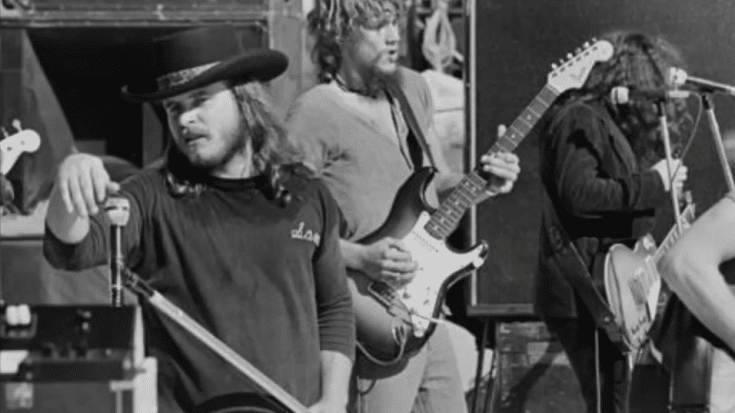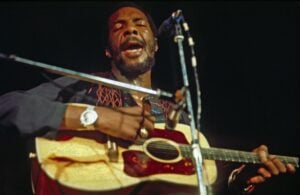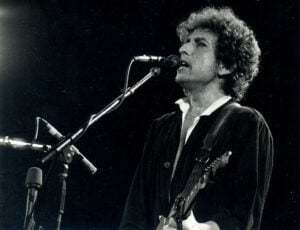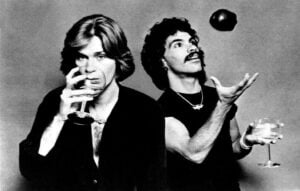5 Iconic Songs Created in Response to Other Tracks

via WS82 Classics / YouTube
Music can be a powerful conversation between artists, echoing beyond the lyrics and melodies to respond to the work of peers. Sometimes, songs are born from a spark of inspiration lit by another track, leading musicians to answer back with tunes of their own. Here, we delve into the stories behind five famous songs that were written as replies, creating music dialogues that continue to resonate through the ages.
1. “Love Will Tear Us Apart” by Joy Division
When Joy Division released “Love Will Tear Us Apart,” it was a direct twist on the title of the cheerful “Love Will Keep Us Together” by Captain and Tennille. Ian Curtis, Joy Division’s frontman, poured his own personal struggles into the lyrics. With challenges in his marriage and dealing with epilepsy, Curtis expressed a darker reality – sometimes love doesn’t bring people closer, it can do the opposite. The song’s somber tone contrasted sharply with Captain and Tennille’s upbeat classic.
Despite its origins from the sunny ’70s hit, “Love Will Tear Us Apart” struck a chord with listeners worldwide, ultimately achieving Platinum status. Its haunting message about the complexities of love, combined with the backstory of Curtis’ tragic suicide just before the single’s release, gave the song a significant place in the ’80s music scene. It communicated feelings that went beyond the gloss of pop romance, creating an enduring anthem for those confronting the heart’s contradictions.
2. “Don’t Worry Baby” by The Beach Boys
Brian Wilson of The Beach Boys admired The Ronettes’ “Be My Baby” so much that it inspired him to create “Don’t Worry Baby.” This classic tune was infused with the Beach Boys’ iconic harmonies but stood out due to its more vulnerable tone. Unlike traditional car-themed songs of the time, which boasted about speed and appeal, “Don’t Worry Baby” shared the worries of a young man facing a drag race, backed by the soothing reassurances of his girlfriend.
The song wasn’t just a nod to the lyrical sentiment of The Ronettes’ hit; it also mirrored its musical structure, even matching the key. The beautiful harmonies and gentle lead vocals showcased a softer side of The Beach Boys, while still capturing the essence of an era obsessed with fast cars and young love. “Don’t Worry Baby” proved that even a beach-going, car-loving band could step out of their comfort zone and touch the heart with tenderness.
3. “Silly Love Songs” by Paul McCartney
After The Beatles broke up, Paul McCartney and John Lennon swapped not-so-subtle digs through their music. McCartney’s “Too Many People” took a poke at Lennon, who responded with “How Do You Sleep?” – a track calling out McCartney for, as Lennon saw it, only writing shallow love songs. McCartney countered with “Silly Love Songs,” a cheeky retort that questioned why anyone should knock a well-crafted love song.
Packed with buoyant melodies and a catchy bass line, “Silly Love Songs” soared to the top of the charts. McCartney hadn’t just come up with a clever comeback; he’d proved his knack for making hits of all kinds, love songs included. The track reinforced McCartney’s place in the music world as a versatile songwriter capable of turning even criticism into gold.
4. “The Rain Song” by Led Zeppelin
George Harrison of The Beatles once remarked to Led Zeppelin’s drummer, John Bonham, that he couldn’t imagine the hard-rocking band playing a ballad. Taking this as a friendly challenge, Jimmy Page composed “The Rain Song.” The thoughtful, melodic track was a departure from Led Zeppelin’s usual heavy sound, and it included a tribute to Harrison’s ballad “Something” in its opening notes.
The song was greeted with critical praise, with many admiring the softer musical direction Led Zeppelin explored. Robert Plant’s soothing vocals, Page’s acoustic guitar, John Bonham’s toned-down drumming, and John Paul Jones’ synthesizer all meshed together to create a ballad proving that even rock giants could find beauty in gentleness.
5. “Sweet Home Alabama” by Lynyrd Skynyrd
Lynyrd Skynyrd’s “Sweet Home Alabama” stands as one of the most well-known response songs, speaking back to Neil Young’s “Southern Man” and “Alabama,” which criticized the South’s past. In “Sweet Home Alabama,” Lynyrd Skynyrd defended the South against broad stereotypes, arguing that pride in their roots didn’t necessarily mean support for racism or segregation.
The song became an anthem, praised for its musical quality and for presenting a more nuanced view of Southern life. With pointed lyrics directly addressing Neil Young, it became an emblem of cultural pride while still acknowledging the region’s complex history. “Sweet Home Alabama” remains a powerful example of music’s ability to engage in social commentary and provoke thought.


















